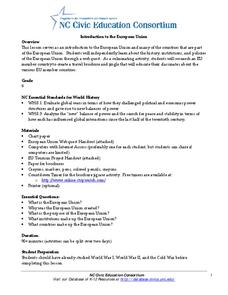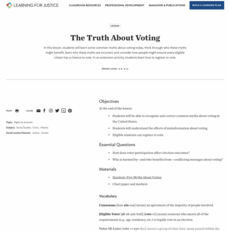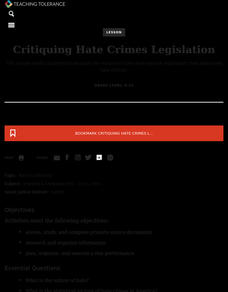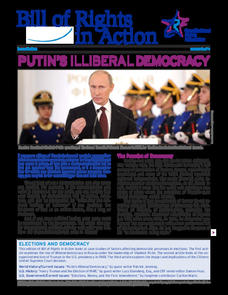iCivics
Municipal Government: High School
Municipal government takes on many roles, not just the ones we are used to hearing about such as Parks and Recreation. Scholars delve into the topic to get a grasp on how the government system functions. They participate in readings,...
iCivics
Tribal Government: High School
Did you know there are 567 federally recognized American Indian and Native Alaskan tribes and villages in the United States alone? The resource helps break down the complexities of many different tribal societies to explain the concept...
Los Angeles Unified School District
Capitalism and Socialism
Capitalism, socialism, communism ... these may seem like a whole bunch of isms to your scholars. High schoolers won't confuse them after completing an informative resource. Your class masters how to use primary sources to critically...
Carolina K-12
Introduction to the European Union
What is the purpose of the European Union, and what institutions and countries comprise it? Check out this resource in which class members participate in a student-led WebQuest activity designed to offer an overview of the European...
PBS
Reading Adventure Pack: Government
A reading adventure pack looks closely at government with the help of two books—one fiction, one nonfiction, and a series of activities. Learners craft a mobile to visualize a balanced government, participate in a scavenger hunt around...
K20 LEARN
Government Power: Do the Actions of Government Effect Me?
What does the government have to do with getting a driver's license? Including the calorie count for a meal on a restaurant menu? By discussing these kinds of questions and researching how concepts behind federal, state, and local...
DocsTeach
The Impact of Bloody Sunday in Selma
Who is to blame when a peaceful protest turns deadly? Scholars research the impact of the civil rights march in Selma, better known as Bloody Sunday. The activity uses files from the FBI's investigation to help academics understand the...
Center for History Education
Speaking Freely In the Soviet Union's Autocratic Government
Speak your mind! The lesson explores the difference in free speech between the United States and the Soviet Union. Academics review the constitutions of both governments, political cartoons, and case studies to understand how freedom of...
Center for History Education
The Founding Fathers and the Constitutional Struggle Over Centralized Power
Believe it or not, the Constitution was America's second attempt at a democratic government. Academics travel back to the past to explore the shortcomings of the Articles of Confederation that would eventually lead to the Constitutional...
DocsTeach
The New Deal: Revolution or Reform?
Scholars weigh in on FDR's New Deal policies in an in-depth activity. The resource uses historical documents to explore whether the New Deal polices were reformatory or revolutionary. Learners review documents, rate them using a scale,...
DocsTeach
Court Packing vs. Reorganizing: The Supreme Court in the New Deal
Travel back in time to understand the effects of FDR's New Deal on the Supreme Court. Academics analyze historical documents to understand FDR's attempts to pack the Supreme Court and the opposition he faced. The activity includes a...
Teaching Tolerance
The True History of Voting Rights
Explore what voting rights really are in an intriguing lesson plan that explores the history of American voting. The resource examines the timeline of voting rights in the United States with group discussions, hands-on-activities, and...
Teaching Tolerance
The Truth About Voting
True or False: Only Presidential elections matter. Academics delve into common voting myths to understand what is true and why the election process is critical to democracy. The lesson uses group discussion, activities, and handouts to...
Teaching Tolerance
Critiquing Hate Crimes Legislation
The high school instructional activity explores what hate crimes are and how the government has responded to those crimes. Academics read legislation, analyze political cartoons, and complete hands-on-activities to understand what...
College Board
Civic Knowledge and Action in AP U.S. Government and Politics
Vote, it's your civic duty! The high school lesson focuses on voter turnout and civic participation with a series of activities. Young scholars analyze data to discover voter turnout trends, complete worksheets, and participate in group...
C-SPAN
Supreme Court Justices Research and Resumes
According to Article III, Section1 of the United States constitution, the only qualification one needs to be appointed to the Supreme Court is to demonstrate "good behavior." The president and Congress are given the power to determine...
C-SPAN
Presidential Veto and Congressional Override
One of the key powers of the executive branch is the president's ability to pass or veto legislation proposed by Congress. Congress, the legislative branch, on the other hand, can override a president's veto. Five film clips show how the...
C-SPAN
Middle School Checks and Balances
Seven video clips reveal how the checks and balances built into the constitutional framework of the United states' government are designed to keep any one branch from becoming too powerful. After watching each clip, groups identify the...
Constitutional Rights Foundation
The Troubled Elections of 1796 and 1800
Congress does more than create new laws. Political scientists delve into the elections of 1796 and 1800 to understand how political parties, the Electoral College, and personal agendas affected the election process. The resource also...
Constitutional Rights Foundation
Putin's Illiberal Democracy
Is Russia really a democracy? High school scholars explore Russian democracy under the leadership of President Putin. The resource provides opportunity for group discussion, writing, and research to understand Russia's political history,...
Constitutional Rights Foundation
Winner-Take-All: The Two-Party System
Two's company, three's a crowd. High school historians learn about the Electoral College, a two-party, winner-take-all voting system in the United States. The lesson explains the pros and cons of the two-party system, roadblocks for...
Constitutional Rights Foundation
Why Don’t More People in the U.S. Vote?
To vote or not to vote, that is the question. Secondary scholars explore voter turnout in the United States. The resource uses informational text, group discussion, and a worksheet to help academics understand hindrances to voting and...
Constitutional Rights Foundation
Purged From the Voter Rolls: Husted v. A. Philip Randolph Institute
Once a registered voter isn't always a registered voter. Academics explore the topic of voter registration and hindrances to remaining registered. The resource focuses on data analysis, federal voter registration law, and Supreme Court...
Constitutional Rights Foundation
270 Votes to Win: The Electoral College in the United States
What exactly is the Electoral College and how does it work? The lesson is part of a larger series on government that explains what the Electoral College is and how it helps determine an election winner. Academics participate in...

























